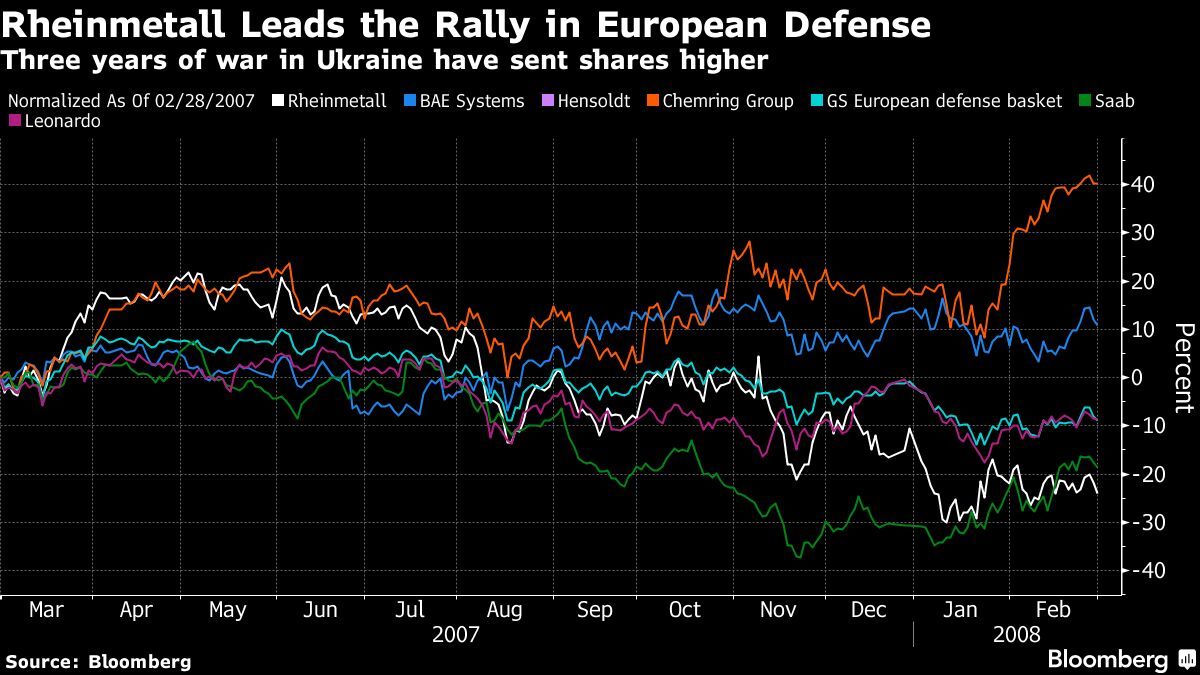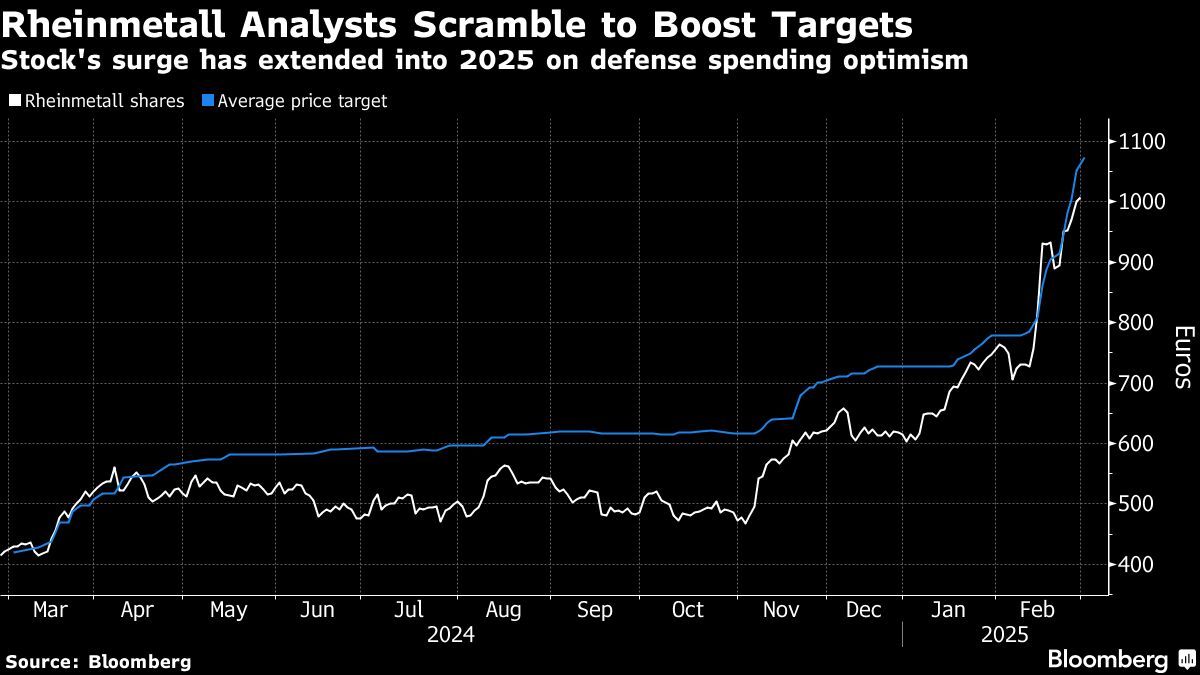
A BAE Systems stand at Farnborough International in 2024. For BAE Systems plc, Europe’s largest weapons maker, defence spending has continued to strengthen over the past year.
(March 3): European defence stocks surged in early trading after the region’s political leaders met to offer Ukraine their support amid concerns of a US pullback.
The Stoxx Europe 600 Index was up 0.1% at 9.06am in Paris (4.06pm Malaysia) with defence stocks rallying strongly. Rheinmetall AG jumped 8.9%, Saab AB rose 11%, and Dassault Aviation SA gained 15%. A Goldman Sachs Group Inc basket of European defence stocks rose as much as 16% to a fresh record, extending its year-to-date gain to 63%.
“This is the trade of the quarter for sure,” said Mabrouk Chetouane, head of global market strategy at Natixis Global Asset Management. There’s going to be further momentum in sectors like tech and defence as the rally in European equities starts to become more concentrated, he said.
The UK and France have been seeking to build what UK Prime Minister Keir Starmer called a “coalition of the willing” to participate in peacekeeping forces and help reassure Kyiv about the durability of any peace. French President Emmanuel Macron told Le Figaro newspaper after a gathering in London over the weekend that the EU should provide €200 billion (RM929.11 billion) to boost its defence capabilities.
The prospect of a surge in defence spending by European countries has led to a sharp rally in the shares of companies involved in the sector. Rheinmetall, which is one of Europe’s biggest suppliers of material for land forces, has already gained 67% so far this year and is up more than 800% since the war started three years ago.
Vincent Juvyns, global market strategist at JPMorgan Asset Management, said that public defence spending will rise sharply in the coming years, even if peace in Ukraine remains a possibility for 2025, the recent diplomatic clashes between allies notwithstanding.
“One senses a large consensus for Europe to take its future in its own hands and that more military spending is coming,” he said.
European stocks have been rallying strongly this year, outperforming the US. February saw the Stoxx Europe 600 extending its lead over the S&P 500 since the end of November. The European benchmark has outpaced its US peer by 10 percentage points over three months. The prospect of peace in Ukraine has been one of the drivers of the rally.
For BAE Systems plc, Europe’s largest weapons maker, defence spending has continued to strengthen over the past year, CEO Charles Woodburn said on a conference call last month.
The British aerospace and defence contractor said the UK’s plan to increase its military budgets will support its major submarine and frigate programmes, and that it’s well positioned to benefit from weapons sales to Nato members.
“Our growth opportunities are significant and we remain focused on consistently executing our long-term strategy to deliver top-line growth, margin expansion and solid cash generation,” Woodburn said.
One question on investors minds is if the region’s defence companies have sufficient capacity available to ramp up output. Even in the event of a peace agreement, there’s a lack of industrial bandwidth available, meaning order books will remain full for years to come.
Enguerrand Artaz, a macro strategist and fund manager at La Financière de l’Echiquier in Paris, also said that there’s no reason for the momentum in Europe to end.
“The change of mindset regarding defence in Europe is seen as a positive; the German industry can redeploy itself into the sector,” he said.
On the equity research side, JPMorgan Chase & Co analysts led by David Perry raised their price targets by an average of 25%, saying Europe’s rearmament cycle was now “for real” and the US’ increasing reluctance to subsidise the region’s defence would lead to more at-home production and fewer imports.
“The events of the last two weeks have turbocharged this thesis,” Perry wrote. “We believe that we will now enter a phase where valuation multiples increase, with earnings upgrades following in time.”
Here’s what market participants are saying:
Emmanuel Cau, head of European Equity Strategy at Barclays
"More than ever, the direction of travel for Europe seems towards more policy loosening, both fiscal and momentary, likely to be growth positive. And more defence spending seems the only way to go, likely to keep supporting defence stocks. Progress towards a ceasefire in Ukraine still looks possible post the weekend events, but shape and timing look very uncertain.
"Overall, it may well turn out to be a positive for Europe to stand on its own two feet, but this will take time. In the meantime, geopolitical risk has certainly gone up, fiscal capacity is constrained and tariffs threat looms. So the jury is still out on whether this watershed moment in global politics will result in a more integrated, more independent and ultimately stronger Europe down the road, or result in more fragmentation. A make-or-break moment for Europe.”
Kevin Thozet, member of the investment committee at Carmignac in Paris
"The main ‘positive’ or rather silver lining in such a context is that European institutions have proved that they can be creative at times of existential crisis. If the so-called old continent does finally manage to speak as one, this would prove to be positive for European assets eventually. If not in absolute, in relative terms."
Daniel Varela, CIO at Piguet Galland
"Despite the intense political news of the past three days, the likelihood of a ceasefire in the coming months remains high, which points to a short-term reduction in political risk and, consequently, a favourable reaction from the stock markets, particularly in Europe.
The impact on the European economy should be positive over the years and obviously defence stocks are expected to continue outperforming.
The prospect of a ceasefire or peace in Ukraine should indeed result in a continued recovery of European stock markets in 2025."
Eli Mizrahi, Managing Partner of Targa 5 Advisors, in Geneva:
"The UK and France’s decision to provide security guarantees to Ukraine and work on a peace plan is a significant step toward strengthening European security. It demonstrates Europe’s commitment to stability and its willingness to take greater responsibility in the region’s future. This effort also comes at a sensitive time, as tensions have emerged between Ukrainian President Volodymyr Zelenskiy and Donald Trump over Trump’s position on military aid. Beyond its geopolitical impact, this initiative provides reassurance to markets by reducing uncertainty and reinforcing investor confidence. A strong and lasting security framework for Ukraine can help support economic resilience and long-term stability in Europe."
Uploaded by Arion Yeow
- Trump hits China tariff retaliation, says policy will remain
- China retaliation on US farm goods hits soybeans, bolstering Brazil
- Wall Street rout drags Nasdaq near bear market
- Axiata, Malaysia Smelting Corp, Lianson Fleet, Radium Development, Mr DIY, KKB, Ho Hup
- ‘Worst-case scenario’ for tech wipes $1.4 trillion from Nasdaq
- LTAT moving forward despite challenges
- ‘Worst-case scenario’ for tech wipes $1.4 trillion from Nasdaq
- Anwar says impact of latest US tariff on nation's economy still being assessed
- Tok Mat, Rubio discuss bilateral relations, Asean-US Special Summit date
- US solar’s hoarding habit will help blunt sting from Trump tariffs


